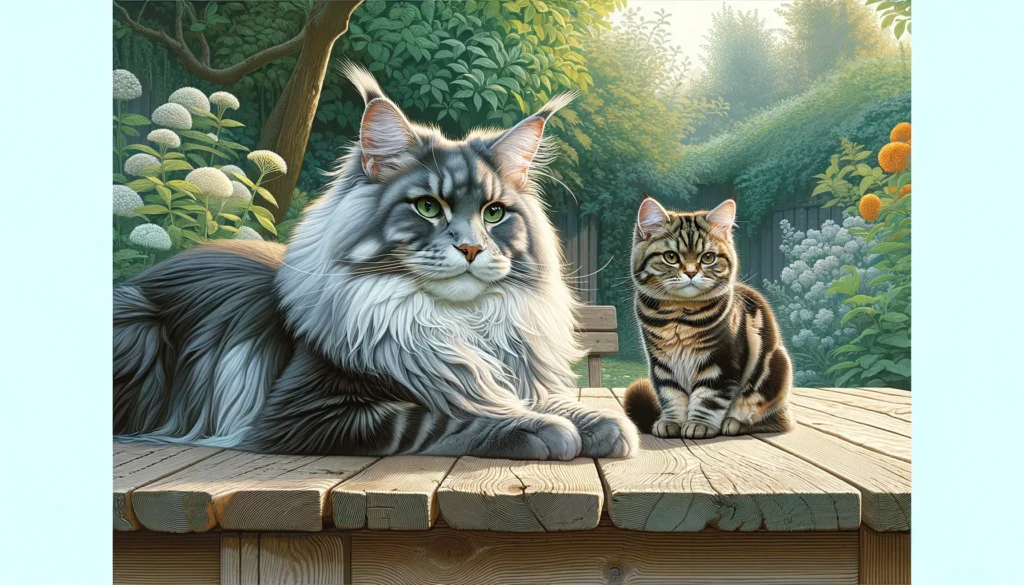
Maine Coon and British Shorthair: Overview of Breeds
Maine Coon and British Shorthair cats are two of the most beloved feline breeds in the world. Both are adored for their unique characteristics and charming personalities. However, they differ significantly in various aspects, from physical attributes to behavioral traits. Understanding these differences can help potential cat owners make an informed decision about which breed suits their lifestyle better.
Size and Build: Physical Attributes
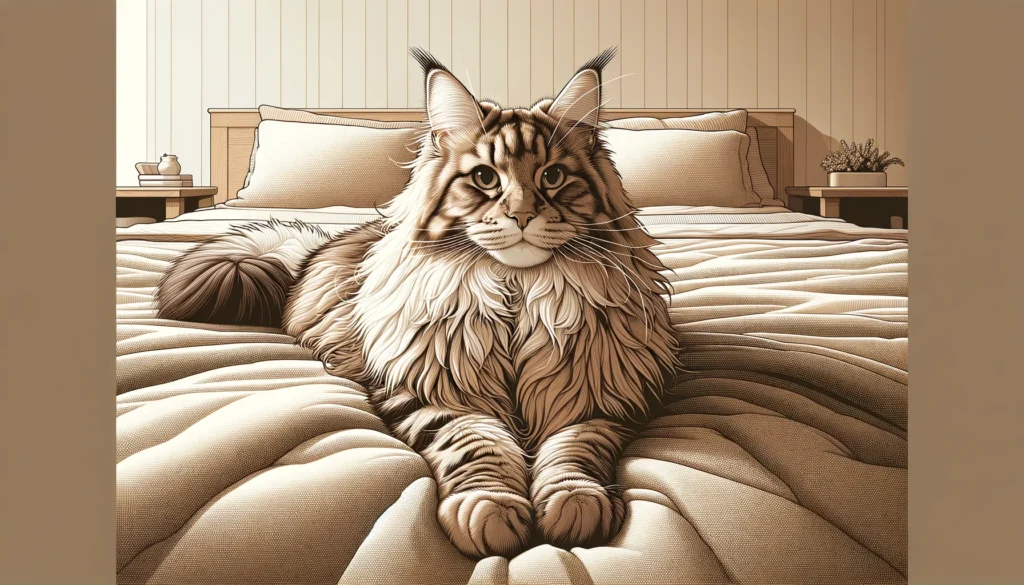
One of the most noticeable differences between Maine Coon and British Shorthair cats is their size and build. Maine Coons are one of the largest domesticated cat breeds, often weighing between 10 to 25 pounds. Their bodies are muscular, and they have long, bushy tails that add to their impressive stature. In contrast, British Shorthairs are more compact and muscular, with a weight range of 7 to 17 pounds. Their round faces and stocky build give them a distinct, teddy bear-like appearance.
Coat and Color: Fur Texture and Patterns
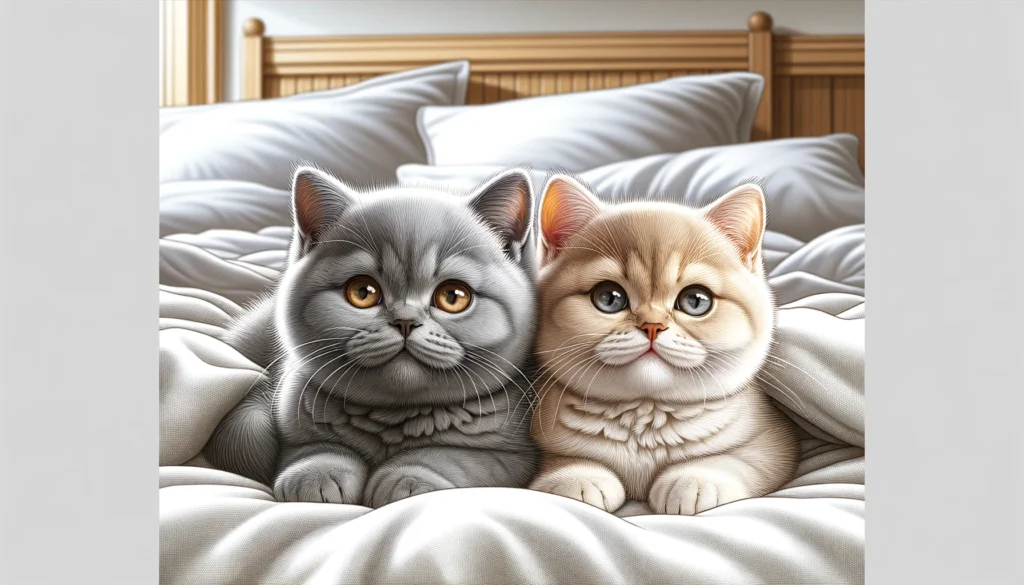
The coats of Maine Coons and British Shorthairs also vary significantly. Maine Coons have long, shaggy fur that is water-resistant and helps them survive in colder climates. Their coats can come in various colors and patterns, including tabby, solid, and tortoiseshell. British Shorthairs, on the other hand, have short, dense coats that are incredibly plush and velvety to the touch. They are known for their classic blue (gray) coat, but they can also be found in a range of other colors and patterns.
Personality and Temperament: Behavioral Traits
When it comes to personality, Maine Coons are often described as gentle giants. They are sociable, affectionate, and good with children and other pets. Maine Coons are also known for their playful nature and intelligence, making them easy to train and engage in interactive play. British Shorthairs, in contrast, are more reserved and independent. They enjoy human companionship but are less likely to demand constant attention. British Shorthairs are calm, patient, and adapt well to a variety of living situations.
Activity Levels: Playfulness and Energy

Maine Coons are relatively active cats. They enjoy climbing, exploring, and engaging in various physical activities. Their playful nature requires plenty of toys and opportunities for exercise. British Shorthairs, while playful, are less energetic. They prefer a more sedentary lifestyle and are content with moderate activity. A few play sessions a day are sufficient to keep them happy and healthy.
Health and Lifespan: Common Health Issues
Health considerations are essential when choosing a cat breed. Maine Coons have a lifespan of 12 to 15 years and are generally healthy, but they can be prone to certain genetic conditions such as hip dysplasia and hypertrophic cardiomyopathy. Regular veterinary check-ups are crucial to maintain their health. British Shorthairs also have a lifespan of around 12 to 15 years and are robust cats, but they may be susceptible to conditions like obesity and dental issues. Keeping them on a balanced diet and regular health checks can help mitigate these risks.
Grooming Needs: Maintenance Requirements

The grooming needs of Maine Coons and British Shorthairs differ due to their coat types. Maine Coons require regular grooming to prevent matting and tangling of their long fur. Brushing them a few times a week is necessary to keep their coats in good condition. British Shorthairs, with their short and dense fur, require less grooming. Weekly brushing is typically sufficient to remove loose hair and keep their coats looking plush.
Suitability for Families: Adaptability and Compatibility
Both Maine Coon and British Shorthair cats can make excellent family pets, but their suitability can vary based on the family dynamics. Maine Coons are highly adaptable and get along well with children and other pets, making them ideal for active households. Their playful and affectionate nature ensures they quickly become beloved family members. British Shorthairs, while affectionate, are more independent and may prefer a quieter environment. They are patient and tolerant, making them good companions for families with older children or singles and couples without children.
Intelligence and Trainability: Learning Capabilities

Maine Coons are known for their intelligence and trainability. They can learn tricks, play fetch, and even walk on a leash. Their eagerness to please and interact with their owners makes training sessions enjoyable and rewarding. British Shorthairs are also intelligent but are less likely to engage in complex training activities. They can be taught basic commands and enjoy puzzle toys that stimulate their minds, but they are generally more content with simple, relaxed interactions.
Vocalization and Communication: Ways They Express Themselves
Maine Coons are vocal cats, often communicating with a range of sounds including chirps, trills, and meows. They use these sounds to express their needs and feelings, creating a dynamic interaction with their owners. British Shorthairs, conversely, are quieter. They are not known for being particularly vocal, and when they do meow, it’s typically soft and infrequent. This makes them a good choice for people who prefer a more peaceful household.
Dietary Requirements: Nutritional Needs
Both Maine Coon and British Shorthair cats have specific dietary needs that must be met to maintain their health. Maine Coons require a high-protein diet to support their large size and muscular build. They benefit from a mix of wet and dry food to ensure they get all necessary nutrients. British Shorthairs, prone to obesity, need a balanced diet with controlled portions to prevent weight gain. High-quality cat food that meets their nutritional requirements is essential for both breeds.
History and Origins: Breed Background
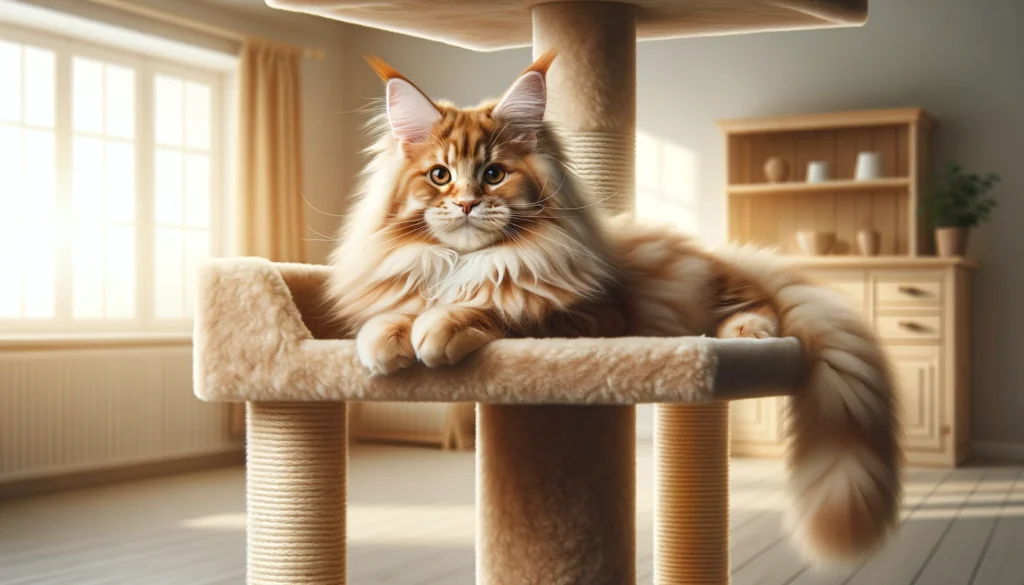
The history and origins of Maine Coon and British Shorthair cats are fascinating and contribute to their unique characteristics. Maine Coons are believed to have originated in North America, specifically in Maine, where they were prized for their hunting skills and adaptability to harsh climates. British Shorthairs have a long history in the United Kingdom, dating back to Roman times. They were developed as working cats, valued for their hunting abilities and resilience.
Popularity and Recognition: Status in the Feline World
Both breeds are highly popular and recognized by cat associations worldwide. Maine Coons are celebrated for their size, friendly nature, and striking appearance. They frequently win awards and are a favorite at cat shows. British Shorthairs are equally revered, particularly for their calm demeanor and distinctive look. They are one of the most popular breeds in the UK and enjoy a loyal following globally.
Cost and Availability: Purchasing and Adoption Considerations
The cost and availability of Maine Coon and British Shorthair cats can vary significantly. Maine Coons are generally more expensive due to their popularity and breeding requirements. Prospective owners can expect to pay a premium for a purebred Maine Coon. British Shorthairs, while still costly, tend to be slightly more affordable. Both breeds can be found through reputable breeders and adoption centers, but it’s essential to research and choose a source that prioritizes the health and well-being of the cats.
Living Environment: Indoor vs. Outdoor Preferences
Maine Coon and British Shorthair cats have different preferences when it comes to their living environments. Maine Coons, with their adventurous spirit, enjoy having access to outdoor spaces where they can explore and climb. However, they can also adapt to indoor living if provided with enough stimulation and opportunities for play. British Shorthairs are typically more suited to indoor living. Their calm and laid-back nature makes them content with a cozy indoor environment, though they still appreciate occasional supervised outdoor time.
Interaction with Other Pets: Sociability with Other Animals
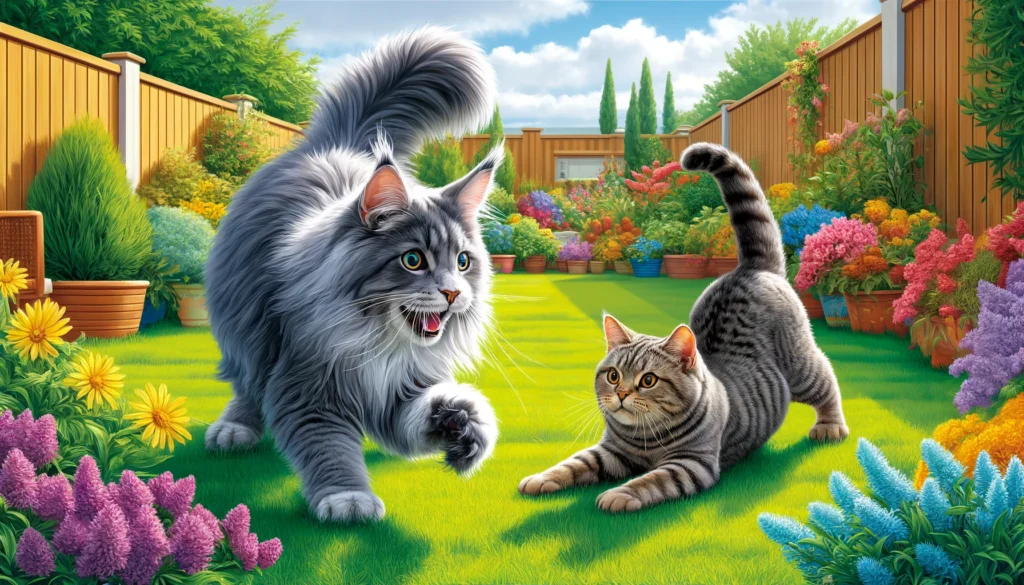
Both breeds generally get along well with other pets, but their interactions can vary. Maine Coons are sociable and enjoy the company of other animals, making them a good choice for multi-pet households. They are often described as dog-like in their interactions, forming strong bonds with other pets. British Shorthairs, while sociable, are more independent and may take time to warm up to new animal companions. They prefer a gradual introduction and space to adjust to new pets.
Ease of Care: Daily Care Practices
The daily care practices for Maine Coon and British Shorthair cats are relatively straightforward but differ due to their specific needs. Maine Coons require regular grooming, plenty of exercise, and a diet that supports their large size. British Shorthairs need less grooming but require careful monitoring of their diet to prevent obesity. Both breeds benefit from regular veterinary check-ups, a stimulating environment, and plenty of love and attention.
Adaptability to Change: Handling New Environments
Maine Coons are known for their adaptability and can handle changes in their environment with ease. Whether moving to a new home or adjusting to new family members, they typically adapt quickly and remain friendly and sociable. British Shorthairs, while adaptable, prefer stability and routine. They can handle changes but may take longer to adjust and prefer a gradual introduction to new situations.
Children and Maine Coon: Interaction with Kids
Maine Coons are excellent companions for children. Their gentle and playful nature makes them a favorite among families with kids. They enjoy interactive play and are patient with younger children, often forming strong bonds and becoming protective family members. Their robust size also means they are less likely to be accidentally hurt during playtime.
Children and British Shorthair: Interaction with Kids
British Shorthairs, while not as playful as Maine Coons, are still good with children. Their calm and patient demeanor makes them tolerant of kids, but they prefer gentle and respectful interactions. They are less likely to engage in rough play but enjoy being around family members and can be very affectionate once they trust their environment.
Exercise Needs: Physical Activity Requirements
Maine Coons have higher exercise needs compared to British Shorthairs. They require plenty of physical activity to keep them healthy and prevent boredom. Interactive toys, climbing structures, and regular playtime are essential for Maine Coons. British Shorthairs, with their more sedentary lifestyle, require less exercise. Short play sessions and a few engaging toys are usually enough to keep them satisfied and healthy.
Unique Characteristics: Special Traits of Each Breed

Each breed has unique characteristics that set them apart. Maine Coons are known for their tufted ears, bushy tails, and gentle demeanor. They have a distinctive chirping sound and are often described as having a dog-like personality. British Shorthairs are famous for their round faces, plush coats, and large, round eyes. Their calm and independent nature, coupled with their endearing appearance, makes them a favorite among cat enthusiasts.
Historical Significance: Importance in Culture and History
Maine Coons and British Shorthairs both hold significant places in feline history. Maine Coons are the official state cat of Maine and have a rich history as working cats on farms and ships. Their origins are shrouded in legend, adding to their allure. British Shorthairs, with their ancient lineage, have been depicted in artwork and literature for centuries. They were the inspiration for the Cheshire Cat in “Alice in Wonderland” and continue to be a symbol of British culture.
FAQs
What is the main difference between Maine Coon and British Shorthair cats?
Maine Coons are larger, more active, and sociable, while British Shorthairs are more compact, calm, and independent.
Which breed is better for families with children?
Both breeds are good with children, but Maine Coons are more playful and interactive, making them better suited for active families.
Do Maine Coons and British Shorthairs have different grooming needs?
Yes, Maine Coons require more frequent grooming due to their long fur, while British Shorthairs need less grooming because of their short, dense coats.
Are Maine Coons and British Shorthairs prone to specific health issues?
Maine Coons can be prone to hip dysplasia and heart conditions, while British Shorthairs may face obesity and dental issues.
Can British Shorthairs adapt to new environments easily?
British Shorthairs prefer stability and routine but can adapt to new environments with time and gradual introductions.
Do Maine Coons and British Shorthairs have different dietary requirements?
Yes, Maine Coons need a high-protein diet to support their size, while British Shorthairs require a balanced diet with controlled portions to prevent obesity.
Understanding the differences between Maine Coon and British Shorthair cats is essential for potential cat owners. Each breed has its own unique set of characteristics, needs, and personality traits. Whether you prefer the playful and sociable nature of the Maine Coon or the calm and independent demeanor of the British Shorthair, both breeds offer wonderful companionship and bring joy to any household.
Sources:
